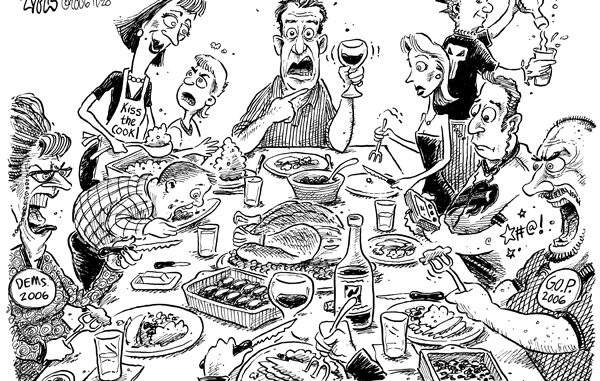
Every year at Thanksgiving, we’re faced with the dinner table dilemma of how to cope with your drunk grandpa, your opinionated aunt or your cousin with an ax to grind. And every year, at least for those who come from your typical, slightly dysfunctional but lovable family, we silently pass the gravy while grinding our teeth.
This post-election year holiday may make it even more difficult.
Hello, my name is Brody and this Thanksgiving I'll be playing the role of Angry Liberal Cousin.
— Brody Thrash (@brodythesloth) November 11, 2016
my pro-trump extended family from wyoming uninvited my family to thanksgiving !! this is a dream come true
— meghan mcginnis (@mcmc_ginnis) November 12, 2016
Lucky for me, I've been uninvited from Thanksgiving dinner for being a Trump supporter so I don't have to spend the day with sore losers.
— T R I U M P H (@aeonicsonic) November 13, 2016
For some families, holidays are just another excuse to get together to eat good food and to have a good time. They’re not looking for articles like this one because they’ve somehow figured out the formula for successful family togetherness with minimum stress. If you have a challenging family, it’s only human to be a bit incredulous and then more than a bit jealous to see other folks living out the holiday fantasy when you’re just trying to live through it.
Just because it’s always been that way doesn’t mean you’re doomed to a lifetime of Thanksgivings where you just grin and go to your happy place until, thank goodness, it’s over! You can make a difference. You may even be able to start to enjoy your personal dysfunctional crowd. With a little planning and some social engineering, you can take control of the situation and make this Thanksgiving feel better.
1. Line up some like minded family members. Chances are you’re not the only one who is irked by your family’s dysfunctional routines. Figure out who you can call on to help make things different. Then do some pre-event strategizing. Agree to tag-team each other with the folks you all find particularly difficult. Set up a signal you’ll use to call in a replacement. Brainstorm ways to steer a certain individual’s most tiresome and troublesome antics in a different direction.
2. Invite “buffers.” Most people’s manners improve when outsiders enter the scene. If you can count on your family to put their best feet forward for company, invite some. (If not, don’t.) There are always people who would love a place to go on holidays or who would like to experience a real American Thanksgiving. Think about elderly people in your church or community whose grown children live far away, or divorced friends whose kids are with the other parent this year, or foreign exchange students from your local high school or college.
3. Take charge of seating. Have some of the younger kids make place cards and assign seats. Folks are less likely to switch places when admiring kids’ handiwork. Put people who rub each other the wrong way at opposite ends of the table. Seat the most troublesome person right next to you or one of your co-conspirators so that you can head off unfortunate conversation topics as soon as they start.
4. Guide the conversation. If your family doesn’t seem to know how to talk without getting into arguments or if you’re not the most socially adept person yourself, give yourself some help by introducing The Conversation Game (see below). Announce at the beginning of the meal that you want to use the gathering as a time to get to know each other better. Ask everyone to indulge you by playing the game for at least part of the meal. Hopefully, people will like this change in family dynamics enough to want to keep it going.
This is a game the whole family can play. Make up a stack of cards with discussion starters on them. Brainstorm “starters” that will make people reminisce or laugh. Make sure to include cards that appeal to all ages. Some ideas are listed below.
To play the game, ask the person to your right to pick a card and read it. Each person at the table gets to answer. It’s fine for someone to “pass” if they don’t have something to say. After everyone has had a turn to respond, the deck gets passed to the next person to choose a card. And so on –
Sample starters:
- What song brings up the happiest memories for you?
- If you were a car, what kind would you be?
- If you were given a thousand dollars with the rule that you couldn’t spend it on yourself, what would you do with it?
- What was the best day of your life so far?
- If you could change places with a celebrity, who would it be and why?
- If you could go to a fancy restaurant and price were no object, where would you go and what would you order?
- What is the best way to cheer you up when you’re down?
5. Provide escape routes. Togetherness is not for everyone. Make sure there are ways for the shyer or more intimidated to get away from the crowd. If most people will be watching football, set up a movie in another room for those who want out. Ask for help in the kitchen to give the overwhelmed person a graceful way to withdraw from the bore who is boring her. Set up a jigsaw puzzle on a card table in a corner so that people who don’t want to be part of the conversation have a way to occupy themselves and still be part of the party. Arrange with one of your co-conspirators to suggest a before- or after-dinner walk for people who need a breather.
Fun drinking game- take a shot every time your relatives start a sentence with "your generation-". Get sloshed by 9am on Thanksgiving
— Josie Curtis (@josie_curtis22) November 23, 2016
read more here: Psych Central



Be the first to comment